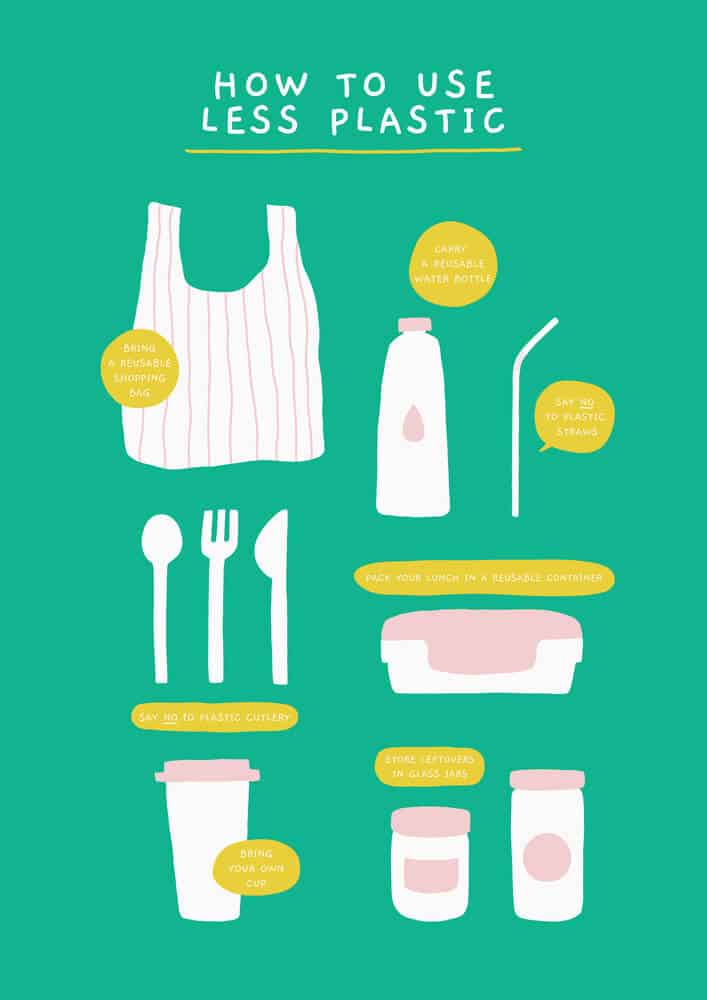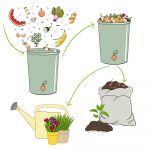In short, no. A zero-waste lifestyle and plastic-free living are not the same things, but being plastic-free is a significant component of becoming zero waste.
Many of us work hard to reduce our impact on the environment by recycling, buying hybrid vehicles, and reducing the amount of plastic we use.
The zero-waste lifestyle has picked up a lot of traction in recent years.
More and more people are trying to reduce the amount of stuff they’re throwing away.
There are several aspects of zero-waste living, and there’s a lot to know.
Is zero waste and plastic-free the same thing? No, but that’s because plastic-free is just an aspect of a zero-waste lifestyle.
Most people are aware of reducing their plastic usage by bringing reusable grocery bags along when shopping, using glass food storage containers and giving up plastic bottle water.
Some grocery stores only offer compostable or reusable bags for purchase to reduce plastic.
When you decide to adopt a zero-waste lifestyle, it can be easy to rush to dispose of all the plastic containers and bags you own, but it’s essential that you keep them until the end of their life and then dispose of them correctly.
Zero waste is all about living thoughtfully and sustainably.
- What does it mean to be zero waste?
- What does being plastic-free mean?
- What Is The Difference Between Zero Waste and Plastic Free?
- What Are The Similarities Between Zero Waste and Plastic Free?
- What happens to our trash and waste?
- Isn’t recycling just as effective?
- Does going zero waste actually make a difference?
- Conclusion
What does it mean to be zero waste?
Living zero waste essentially means that you don’t want to send anything to a landfill.
It’s much more complex than just that, but the simple answer is to reduce your waste entirely.
It is recycling and composting as much as you can while purchasing plastic-free and reusable options to replace traditional containers and products that go in the trash.
Those who are engrained in the lifestyle know that it’s more than that.
Zero waste is about changing the way we live and redesign the whole system.
In our current society, we have an economy that produces a lot of waste without regard for the environment and where that waste goes.
Many of us are taught to throw out a lot of waste, and continuing that pattern will result in dire consequences.
Zero waste is about creating a circular economic system that eliminates waste entirely.
Much like how ecosystems work in nature, zero waste aims to create a similar system for humans.
Instead of dumping wasted resources, the system should reintegrate those unused resources back into the cycle.
Zero waste has a significant philosophy behind it, including the 5 R’s, which are:
- Refuse – Say no to any single-use plastics and materials that can’t be recycled, like straws and bags at the store.
- Reduce – Consider all your buying choices. Reduce as much as possible where you can. Opt for all-natural products, including making your own cleaning products.
- Reuse – Keep your items for as long as possible. If something breaks, have it repaired. Purchase clothes at thrift shops, purchase second-hand items and reuse as much as you can.
- Recycle – By the time you get through refusing, reducing, and reusing items, you shouldn’t have a lot left to recycle. Recycling everything you can helps avoid trash going to the landfill.
- Rot – All your food waste should be composted, and once it’s broken down, you can use it as a fertilizer for your home garden.
Authentic zero waste living is almost impossible, but reaching for that goal still means that you’re reducing your waste as much as possible.
It’s meaningful progress in the right direction. Suppose you choose only to go plastic-free and adopt parts of the zero-waste lifestyle.
In that case, you’re still making positive changes and helping reduce your impact on the environment.
Every little choice adds up and can result in a significant difference.
What does being plastic-free mean?
As a critical pillar in the zero waste philosophy, plastic-free means not using or purchasing any products with plastic packaging or components.
You may have already noticed some of your favorite restaurants opting for paper straws and more sustainable take-out containers.
Plastics are one of the most detrimental materials for our environment.
It causes a lot of harm in its wake.
Due to the fact that it can live in landfills and nature for decades without decomposing, it’s especially harmful to our oceans, hurting wildlife and contributing to other environmental implications.
There are both short-term and long-term effects.
Large companies opt for plastic because it’s durable, affordable, easy to adapt, and economical.
It’s become the standard product to use for packaging, shipping, and goods.
Due to this, our society feels pretty dependent on plastic, which is making the shift to plastic free living complex and challenging.
Living plastic-free can include making changes like:
- Finding alternative products with more sustainable packaging
- Making your own products, like sauces, cleaning products, or planting your own garden.
- Keep your current plastic products and use them until they’re ready to be disposed of, but don’t purchase any new plastic products.
- Shop sustainably with reusable bags at local shops or the farmer’s market.
- Use reusable coffee tumblers if you want a beverage from a coffee shop and carry around a reusable water bottle.
- Opt for glass milk, soda, beer bottles over plastic.
- Carry reusable utensils to work for your lunches, even if you order take-out.
There is an endless number of tips for reducing your plastic usage.
If you’re just starting a zero-waste lifestyle, pick a couple of big ones, build the habit, and move on to adopting more plastic-free practices.
What Is The Difference Between Zero Waste and Plastic Free?
Although there are many similarities between the concept of zero waste and the concept of plastic-free, there are some key differences between these two concepts that you should know about.
The concept of zero waste means that you are not creating any waste.
However, the concept of plastic-free means that you can create waste.
However, this waste from practicing the plastic-free concept just can’t be made of plastic but can be made from other, more eco-friendly and sustainable materials.
The concept of zero waste includes not using any material that has to be thrown away.
These materials that have to be thrown away that you need to avoid by practicing the concept of zero waste include plastic.
However, the concept of plastic-free includes only not using plastic. This exclusion of only plastic items while practicing the concept of being plastic-free leaves open the possibility that you can use products that use other materials.
These other materials that you can use to replace plastic while still practicing the concept of living plastic-free might be excluded if you try to practice the concept of zero waste.
What Are The Similarities Between Zero Waste and Plastic Free?
- Both the concept of zero waste and the concept of plastic-free both exclude the use of plastic.
- Both the concept of zero waste and the concept of plastic-free are great ways to practice living a sustainable and eco-friendly lifestyle.
- Both the concept of zero waste and the concept of plastic-free help the environment.
- The concept of zero waste and the concept of plastic-free helps prevent unnecessary trash from ending up in landfills and other garbage sites.
- By eliminating having to buy items that come in plastic packaging, as can be the case with practicing the concept of plastic-free, you could choose to buy items that you need that don’t go in there any packaging at all.

What happens to our trash and waste?
As a society, we are producing more waste than ever. In the UK, residents produce over 200 million tonnes of waste every year.
In the US, there were 262 million tonnes of municipal trash produced in 2015.
That means that each resident produces around 4.5lbs of garbage each day, compared to the UK’s 2.9lbs.
That is a lot of garbage that just sits in landfills, unable to decompose, and starts to wreak havoc on our environment.
While many states are working to make changes to this system to improve our future waste management systems, these systems take a lot of time to implement.
Even though recycling has become the norm, and most households make a solid effort to recycle, it’s not enough.
Isn’t recycling just as effective?
Recycling is undoubtedly helpful, but it’s not as effective as not purchasing or obtaining plastic in the first place.
A low percentage of plastic is actually recycled, as the standards for using recycled materials are quite stringent for companies.
Does going zero waste actually make a difference?
Absolutely it does. Adopting a zero-waste lifestyle or simply going plastic free can be a considerable shift in your habits and can change your lifestyle significantly, but that doesn’t mean you shouldn’t try.
Even small changes add up to a big difference, and you should feel proud that you’re even considering how to reduce your waste.
Start with a couple of aspects of zero waste that are important to you and easy to adopt, so it doesn’t feel like a huge change.
Conclusion
Once you’ve mastered those, adopt some more.
As mentioned, being entirely zero-waste may not be possible, but trying is the key.


